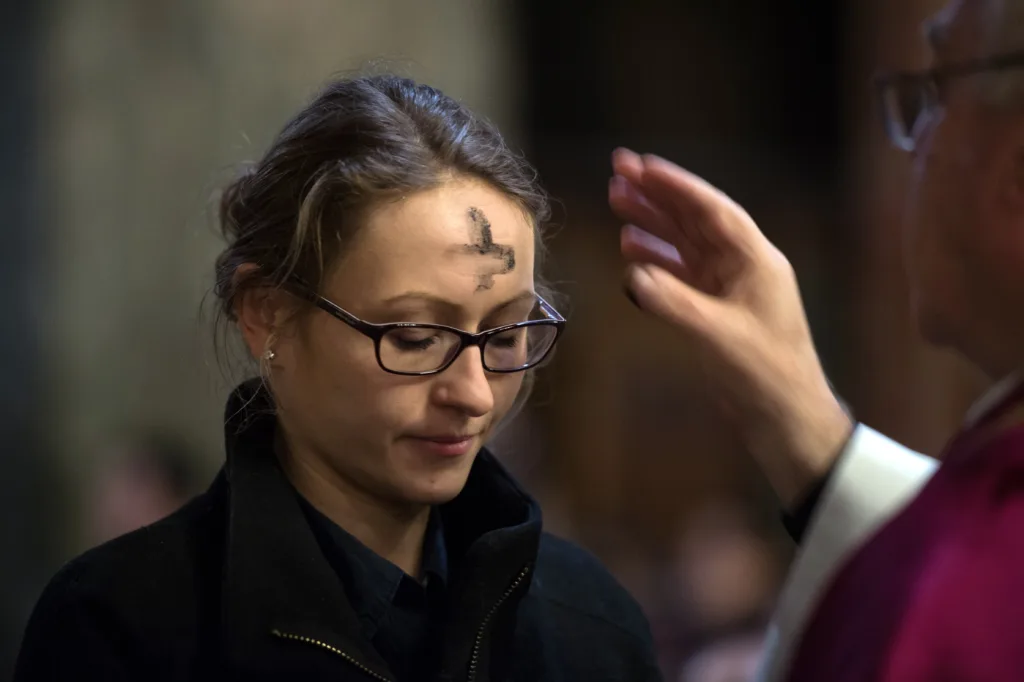
by Katie Yoder
WASHINGTON (OSV News) — Catholic couples and liturgical experts are advising how to observe Ash Wednesday — the beginning of the Latin Church’s penitential season of Lent leading up to Easter — which falls on Valentine’s Day, Feb. 14, this year.
The former is a day of prayer, penance and fasting; the latter, a day associated with chocolates and elegant, romantic dinners. But both, experts say, actually center on love.
“The season of Lent is really a reminder to us all about the greatest act of love ever imaginable, which is Christ’s suffering and death on the cross,” said Julia Dezelski, associate director for marriage and family life at the U.S. Conference of Catholic Bishops’ Secretariat of Laity, Marriage, Family Life, and Youth.
“Love — the ultimate expression of love — is the cross,” she told OSV News. “I think it’s a great poignant reminder, especially to married couples — even to those who are dating or engaged — that the cross is present in any true form of love and love requires sacrifice, because it is the giving of self to another.”
Experts shared creative ways for couples to approach Feb. 14, while, at the same time, agreeing that Ash Wednesday takes precedence over traditional Valentine’s Day celebrations.
“Nothing ever pushes Ash Wednesday out of the way,” Father Dustin Dought, executive director of the USCCB’s Secretariat of Divine Worship, said of the day placed 46 days before Easter. “Everything gives way to Ash Wednesday when it comes to the liturgical calendar.”
The last time the two days merged took place in 2018. The next occurrence — and the final one for the 21st century — will be in 2029.
Valentine’s Day, which always falls on Feb. 14, takes its name from an early Roman martyr, St. Valentine, who is associated with legends of secretly marrying Christian couples.
But the occasional coincidence of these days is relatively recent — and one unique to Catholics in the Latin Church. In 1969, St. Valentine’s feast day was removed from the Roman liturgical calendar, which now lists Sts. Cyril and Methodius, ninth-century missionaries to Eastern Europe, for Feb. 14 — the day of St. Cyril’s death in 869. (Eastern Catholics in the Ukrainian or Ruthenian churches celebrate Sts. Cyril and Methodius liturgically on May 11 — however, Valentine’s Day this year still ends up falling within Great Lent, where daily fasting and abstinence from meat started Feb. 12, or Clean Monday.)
“St. Valentine’s Day is still observed by the Roman Catholic Church on February the 14th, it’s just that St. Valentine is not celebrated liturgically,” Father Dought explained. The Latin Church’s Roman calendar makes Sts. Cyril and Methodius an “obligatory” feast day, meaning there is no option to celebrate liturgically other saints who share that day.
In any event, Ash Wednesday, he said, sheds additional light on Valentine’s Day.
“The convergence of the two celebrations on the same day can help us understand each celebration more deeply,” he said.
The coinciding days remind Catholics that penance is something that the community of the church — including couples — does together rather than alone as individuals, he highlighted.
“With Valentine’s Day falling on that day, I think it shows that penance is something that a couple could do — something that those who love each other could do,” he said.
Together, he added, the two days emphasize that prayer, fasting and almsgiving is never an end in and of itself, but rather are done for the glory of God and out of love for neighbor.
“I can engage in my fasting and my prayer and my almsgiving on Ash Wednesday with the intention for my beloved — that I am engaging in these practices of the church so that my beloved might receive every grace and heavenly blessing,” he said.
For her part, Dezelski recommended that couples consider small acts of love that require a giving of self.
“If there’s anything which demonstrates love beyond the words that we might use to express it, it’s an action,” she said.
Dezelski drew from the 2024 theme of National Marriage Week USA, “Love Beyond Words.”
Every year, the USCCB celebrates National Marriage Week USA, held Feb. 7-14, in support of marriage and family life. As a part of the week, Dezelski encouraged couples to consider taking part in an at-home retreat for couples available at the bishops’ website, which she called a “nice prelude” to celebrating Valentine’s Day on Ash Wednesday.
Couples can explore other USCCB resources for their marriages at ForYourMarriage.org, PorTuMatrimonio.org and LoveMeansMore.org.
Dezelski also recommended making a charitable donation in honor of a loved one. Other ideas included couples receiving ashes together on Ash Wednesday and asking forgiveness of one another. She also recommended people reflect on how they demonstrate their love to each other, day after day.
For her part, Dezelski revealed that she would be happy with a bouquet of red roses from her husband.
“The roses for me, in particular, remind me of not only God’s beauty at work — and just the beauty of a budding rose — but also, it also is reminiscent of the cross just because of the blood red,” she said.
The two were married in the Byzantine rite, which Dezelski has written about in the past for the Spoken Bride lifestyle blog, which emphasizes the sacrificial nature of love. The crowns that the bride and groom receive during the wedding ceremony symbolize the martyr’s crown.
“They’re entering a covenant of love that is going to require sacrifice and a giving of one’s life for the other,” she described.
Mary-Rose Verret, who founded the Witness to Love marriage ministry along with her husband, Ryan, shared that they will celebrate Valentine’s Day by attending or hosting marriage-building community events on the surrounding days, praying a special novena, and inviting couples to focus on the beauty and gift of marriage rather than participating in the commercialization of the day.
Verret revealed that the number one thing they hear about from couples in their ministry is a desire for their parishes to offer opportunities for couples to come together in community.
Their own parish, the Cathedral of St. John the Evangelist in Lafayette, Louisiana, offers an opportunity to do this either the week of Valentine’s Day or the week before, by organizing a dinner for couples. They rely on local restaurants to donate food for the free event that hosts speakers working in various ministries (including the Verrets).
“What we’re doing this year is, we’re going to that date night at our parish the week before (Valentine’s Day),” she said. “On actual Valentine’s Day, we’ll probably have really nice soup for dinner as a family.”
The day after Valentine’s Day, Witness to Love holds an event called “Rock ‘n’ Marriage” at a Lafayette bowling alley for couples served by their ministry, as well as for those couples’ mentors and parish priests.
Every year leading up to Valentine’s Day, the Verrets also pray a couple’s novena, available on their ministry’s website, witnesstolove.org, and ask for the intercession of married saints.
“There’s different seasons in life,” Verret said, “and sometimes the way the calendar falls, you just have to. . . do things differently that year and it ends up being special either way.”






